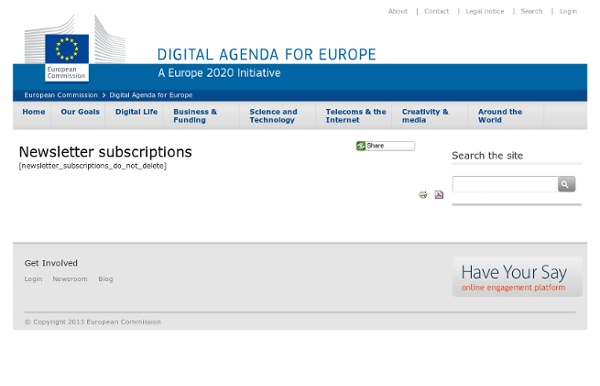



Debategraph To achieve the goals set out in the Digital Agenda for Europe, the Commission is working closely with national governments, concerned organisations and companies – with an annual Digital Assembly bringing stakeholders together to assess progress and emerging challenges. Introduction The overall aim of the Digital Agenda is to deliver sustainable economic and social benefits from a digital single market based on fast and ultra fast internet and interoperable applications. The crisis has wiped out years of economic and social progress and exposed structural weaknesses in Europe's economy. Europe's primary goal today must be to get Europe back on track. To achieve a sustainable future, it must already look beyond the short term. The European Commission launched in March 2010 the Europe 2020 Strategy to exit the crisis and prepare the EU economy for the challenges of the next decade. This great potential of ICT can be mobilised through a well-functioning virtuous cycle of activity.
» 78,1% van de bedrijven zet in 2011 social media in, slechts 47% meet de resultaten Dat zijn een aantal van de vele conclusies uit het onderzoek dat wij bij Pondres Social Marketing eind vorig jaar en begin dit jaar hebben uitgevoerd samen met onderzoeksbureau MWM2. De resultaten van dit onderzoek zijn inmiddels geanalyseerd en geven een krachtig beeld over de stand van zaken van social media binnen het Nederlandse bedrijfsleven (van klein tot groot) en de ontwikkelingen in 2011. Aan ons onderzoek hebben 268 bedrijven deelgenomen. De enquête is verspreid op diverse weblogs, via DDMA en onder klanten van Pondres. Dit heeft onder andere geleid tot de volgende conclusies: Nieuwsgierig geworden door de resultaten? Deel deze post met je netwerk!
Social Media as a DA platform Like any other initiative in the private or public sector, the Digital Agenda Europe and its eight different topics have the same challenge to overcome: getting to the right audience and spark an engagement – in this case even across Europe. (#da12social) The commonalities between all topics are striking similar: How to create awareness? Social Media is basically the platform to provide those services and support those concepts. There is no reason why the Social Media group should have the highest level of awareness, other than they use the media for their own activities. It is advisable to provide a Social Media overlay service for all Digital Agenda disciplines to raise awareness and address more people ensuring that relevant and highly skilled experts join the respective initiative. 1) Ensure that every DA group has at least one experienced social media practitioner as one of the first functions right when a new DA meeting is planned. @AxelS
Social media in Nederland: de cijfers (mei 2012) Twitter Overigens kon comScore tijdelijk geen time spent-cijfers bekendmaken voor afgelopen maand. Op basis van o.a. het Stats Dashboard op Marketingfacts en het onderzoek van Newcom Research stelde Yellow Lemon Tree onderstaande infographic samen: Facebook Hét Facebook-nieuws van de afgelopen maand was natuurlijk de IPO. Op vrijdag 18 mei was het dan zover en debuteerde Facebook aan de technologiebeurs Nasdaq. Ondanks deze twijfels werd de introductiekoers van het sociale netwerk naar boven bijgesteld en werd ook het aantal aandelen verhoogd. Ondertussen groeit het bezoek in Nederland aan Facebook.com nog altijd, maar lijkt het wel zijn plafond te hebben bereikt. Twitter Onderzoek van Semiocast toont aan dat we in Nederland de meest actieve twitteraars zijn. Semiocast stelt tevens vast dat de VS nog altijd het grootste aandeel heeft in het totaal aantal gebruikers (107,7m accounts), gevolgd door Brazilië (33,3m accounts) en Japan (29.9m). Google+ Pinterest Slideshare Tumblr
Ivo_64 : Making small businesses mo... Waarom zit iemand niet op Facebook? Hier 14 redenen Facebook heeft 900 miljoen gebruikers wereldwijd en ook in Vlaanderen en Nederland zijn de gebruikersaantallen opmerkelijk hoog. Bovendien logt ongeveer de helft van al die gebruikers dagelijks aan en gaan er weinig dagen voorbij waarop de sociale netwerk site eens niet in de traditionele media tevoorschijn komt. Maar in een wereld waarin Facebook alom tegenwoordig lijkt, zijn er nog steeds heel wat mensen die Facebook niet gebruiken of hun account deactiveerden. Wat zijn hun motieven en hoe kijken ze naar de Facebook-trend? De Hogeschool-Universiteit Brussel trok op onderzoek en ondervroeg 2148 Vlamingen en Nederlanders over hun afwezigheid op de sociale netwerk site. De helft van de deelnemers aan dit onderzoek is tussen 45 en 62 jaar oud. Facebook lag de voorbije jaren wel eens vaker onder vuur omwille van privacy-inbreuken. Het onderzoek komt tot enkele opvallende resultaten. Drie op de vier mensen hebben meer dan 1 reden om niet actief te zijn op Facebook. Facebook. Opgelet!
DAE Blog --- Posted by Khalil Rouhana , DG INFSO, Director "Digital Content and Cognitive Systems" There are many reasons that explain why data is becoming increasingly important in our lives. Firstly, a large number of devices - from scientific instruments like genomic sequencers or telescopes to mobile phones to very tiny sensors - generate much more data than humans could by themselves. Secondly, advances in digital storage technologies mean it is now cost effective to store large quantities of data for further analysis. Finally, advances in information retrieval to data mining and machine learning have made it possible to extract very valuable information from enormous amounts of data so that we are now able to analyse phenomena that were too big for us to perceive. Size is not the only thing that has changed. - What is needed to set up EU-wide data markets to allow those with data to sell it as a product? - Are there any data domains that ought to be managed as Europe-wide public goods?
Remi_Vladuceanu : #FollowFriday Making noise...